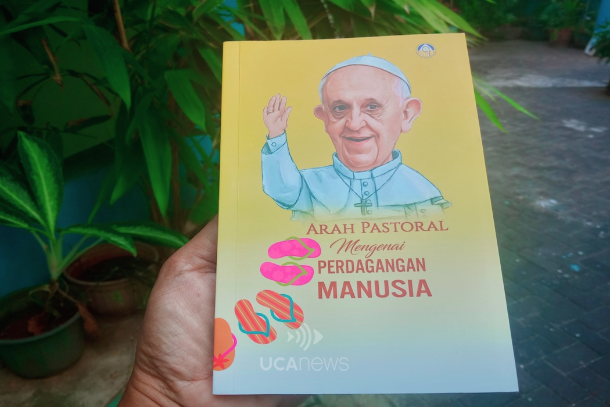Naskah ini diterbitkan di ucanews.com :
Indonesian Church publishes local anti-trafficking guide
Translation of Vatican document aims to 'help local people better understand and fight against human trafficking'

Oleh Katharina R Lestari, Jakarta
Indonesia
June 20, 2019
---------------------------------------------------------------------------------------------------------------------
The Catholic Church in Indonesia has introduced a local translation of the Vatican’s anti-human trafficking document to enable Catholics to better understand the Church’s stance on the crime and warn others about the danger in poses.
The Migrants and Refugees Section of the Vatican’s Dicastery for Promoting Integral Human Development published a 36-page document “Pastoral Orientations on Human Trafficking” in January this year.
The aim was to provide understanding, prevent and eradicate the trafficking of persons and to protect victims and aid in their recovery.
The document is the result of extensive consultations with church leaders, scholars, experienced practitioners and partner organizations working in the field.
Jesuit Father Ignatius Ismartono, an adviser to Sahabat Insan, a charity dealing with issues faced by Indonesian migrant workers took on the task of the translation work in cooperation with Jesuit Father Adrianus Suyadi, the social ministries secretary at the Jesuit Conference of the Asia Pacific.
“What the pope says in the document is also the concern of the Indonesian people. That is why I translated it into Bahasa to make it easier for Indonesian people to understand it,” Father Ismartono told ucanews.com at the launch of the printed translation in Jakarta on June 18.
The bishops’ Commission for Justice and Peace and the Pastoral Care of Migrants and Itinerant People has published the local version.
Father Suyadi said many people only focus on response and advocacy when dealing with human trafficking.
“But this document gives a wider understanding of the whole issue. This what makes it very important to Catholics,” he said.
The document describes how in industries such as agriculture, fishing, construction and mining, human trafficking has proliferated through collaboration among numerous and various perpetrators making it a phenomenon more complex than most people think.
Ursuline Sister Irena Handayani of Jakarta Archdiocese’s Caring for Migrant Workers Network said the translation should help her raise awareness about the problem.
“I have told many people what human trafficking is all about, but many still don’t get it. With this Indonesian translation to hand, I believe more will be aware of the dangers,” she told ucanews.com.
Migrant advocacy groups, and the Catholic Church say human trafficking is a major problem in Indonesia and consider rules regulating employment agencies and brokers sending people abroad to work to be lax.
Many cases have emerged where Indonesian workers have fallen victim to exploitation by employers overseas. Others have been physically abused ore even killed by employers.
According to the International Organization for Migration East Nusa Tenggara province has the highest number of human trafficking cases in Indonesia. There have been at least 7,200 victims from the province, 82 percent of whom were women.
